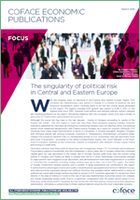CEE(中東欧)におけるポリティカルリスクの特異性

With the ongoing wave of elections in the Central and Eastern Europe region, CEE countries are experiencing a key period of change in a context of political risk and economic acceleration, which currently seem to be the two crucial issues attributed to the region. The region’s average GDP growth rate soared to 4.5% in 2017, i.e. the highest level since 2010. However, local politics and national judiciary system changes are creating problems for the region. Worsening relations with the European Union (EU) and a threat of sanctions for Poland have raised additional concerns.
Although the social risk has risen in the last decade – mostly in Hungary, according to results of the Coface risk model –, the CEE region is much less risky than other emerging regional markets. However indicators published by international institutions monitoring freedom and civil liberties within the political system show weakened assessments, with Poland joining Hungary as a cause for concern. Although CEE countries have made huge improvements in terms of corruption, it remains prevalent: Bulgaria, Hungary, and Romania placed last among European countries in Transparency International’s corruption index. Despite the numerous benefits that EU membership brings to CEE economies, they are becoming more and more “Eurosceptic”: according to the latest Eurobarometer results, the Czech Republic is the thirdmost Eurosceptic member of the community, despite its integration with Western Europe supply chains and strong EU trade links.
Hard data indicates that these political issues have yet to negatively impact CEE economies and businesses. Fiscal easing supports households, and also businesses in some cases, like in Hungary where the corporate capital gains tax was decreased to the lowest rate in Europe. Opinion polls show that the current ruling parties in Hungary and Poland are likely to extend their terms in office. Admittedly, controversial changes to legal systems have triggered social discontent, and demonstrations have been experienced in a number of countries, but companies, including foreign entities have yet to back out of the CEE region. The inflow of foreign investments remains positive and a number of large investments are conducted in the region. It seems that the advantages of price and quality competitiveness, geographical proximity to Western Europe, and solid economic expansion prevail over political concerns. Any possible further deterioration in terms of political risk could make foreign entities reluctant to remain in CEE countries, especially if it would hurt them directly. If the idea of linking EU funds to the rule of law was implemented, economies would not collapse, but certain businesses would suffer. Due to a significant cooperation with the public sector using EU cofinancing, construction and ICT would be the first sectors hit, with their partner sectors second to experience deterioration. Ultimately, a compromise to these clashed relations would be the most reasonable scenario.
Download the Publication





